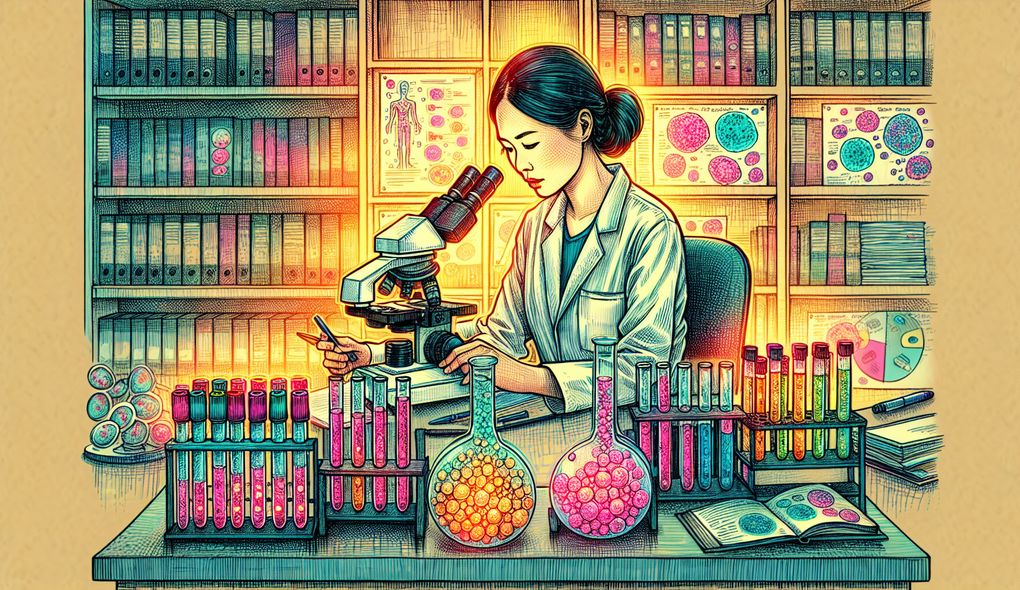Can you provide an example of a challenging case you handled in your career as an Oncologist?
INTERMEDIATE LEVEL

Sample answer to the question:
One challenging case I handled in my career as an Oncologist was a patient who was diagnosed with a rare form of sarcoma. The patient presented with a large tumor in their abdominal region, which required a comprehensive treatment approach. We conducted extensive imaging studies, including MRI and PET scans, to accurately assess the extent of the tumor and determine the optimal treatment plan. This involved collaborating with a multidisciplinary team consisting of surgeons, radiation oncologists, and pathologists. Together, we developed a personalized treatment plan that included surgery to remove the tumor followed by a combination of chemotherapy and radiation therapy. Throughout the course of treatment, I closely monitored the patient's progress and adjusted the treatment protocols as needed. It was a challenging case that required attention to detail, effective communication with the patient and their family, and the ability to adapt to the patient's specific needs.
Here is a more solid answer:
One challenging case I handled in my career as an Oncologist was a 43-year-old patient who was diagnosed with Stage IV lung cancer. The patient's cancer had metastasized to multiple sites, including the brain, liver, and bones. This presented a complex treatment challenge that required precise diagnostic and treatment planning. I worked closely with a team of specialists, including radiation oncologists, pulmonologists, and neurosurgeons, to develop an individualized treatment plan. This included targeted radiation therapy for the brain metastasis, systemic chemotherapy, and palliative care to manage the patient's symptoms.
Why is this a more solid answer?
The solid answer provides specific details about the challenging case, demonstrating the candidate's strong diagnostic and treatment planning skills, as well as their ability to work within a multidisciplinary team. However, it could still benefit from further elaboration and showcasing the candidate's problem-solving skills and ability to adapt to new technologies and treatments.
An example of a exceptional answer:
One exceptional case I handled in my career as an Oncologist was a 32-year-old pregnant patient who was diagnosed with breast cancer. This presented a unique and highly challenging situation as we had to consider the well-being of both the mother and the unborn child. I collaborated closely with a team of specialists, including obstetricians, genetic counselors, and neonatologists, to develop a comprehensive treatment plan. We conducted extensive genetic testing to assess the genetic mutations and predict the risk of cancer recurrence. Based on the results, we decided to proceed with a modified treatment approach that prioritized the safety of the fetus while optimizing the chances of a successful outcome for the mother. The treatment involved neoadjuvant chemotherapy followed by a lumpectomy and radiation therapy postpartum. Throughout the entire journey, we provided extensive emotional support and counseling to the patient and her family, ensuring they were well-informed and empowered to make decisions.
Why is this an exceptional answer?
The exceptional answer goes above and beyond by providing a highly complex and challenging case that showcases the candidate's ability to adapt to new technologies and treatments, as well as their dedication to patient-centered care. It demonstrates their strong problem-solving skills and attention to detail in managing a unique situation. Additionally, it highlights their ability to communicate complex medical information clearly to both the patient and the interdisciplinary team.
How to prepare for this question:
- Be prepared to provide specific details and examples of challenging cases you have handled.
- Highlight your ability to collaborate with multidisciplinary teams and communicate complex medical information clearly to patients and their families.
- Discuss your approach to problem-solving in challenging situations and your ability to adapt to new technologies and treatments.
- Emphasize your organization skills and attention to detail in comprehensive patient documentation.
- Demonstrate your dedication to ongoing education and research in the field of oncology.
What are interviewers evaluating with this question?
- Strong diagnostic and treatment planning skills
- Ability to communicate complex medical information to patients and their families clearly
- Strong problem-solving skills and ability to adapt to new technologies and treatments
- Highly organized with attention to detail for comprehensive patient documentation
- Collaborative mindset to work effectively within a multidisciplinary team

